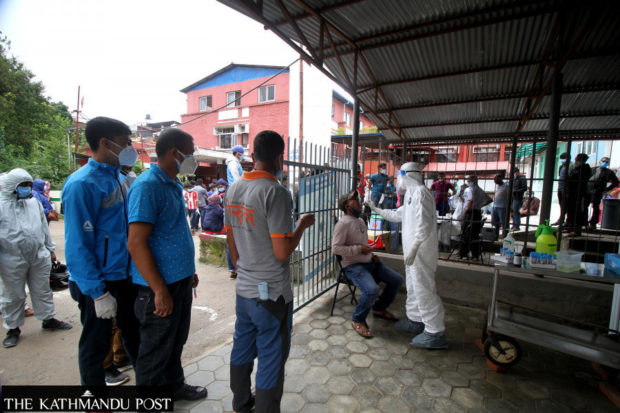KATHMANDU — Until a few weeks ago, Sukraraj Tropical and Infectious Disease Hospital had been dealing primarily with cases of scrub typhus, Kala-azar, malaria, dengue, and snakebite.
With the start of monsoon season in Nepal, cases of waterborne diseases, including cholera, saw an alarming rise. And lately, Covid-19 cases have also started to resurge. Now, the hospital is admitting patients suffering from those diseases in increasing numbers, according to Dr Manisha Rawal, director at the hospital.
“Half of the intensive care unit beds have already been occupied by patients with serious ailments,” she said. “And if the coronavirus cases surge further, we will have to deal with a double whammy of Covid and non-Covid cases.”
For the last two years, health workers throughout the country have been dealing with both Covid-19 cases and seasonal diseases. Cases of seasonal diseases—both waterborne and vector borne—dipped over the period, as people followed public health measures for fear of coronavirus infection.
But with the decline in new Covid-19 cases, things got back to normal, making both the public and authorities concerned complacent.
As a result, cases of both the coronavirus and seasonal diseases have started to spike.
Dr Niraj Bam, an associate professor at the Institute of Medicine, said that the Tribhuvan University Teaching Hospital, where he serves, has admitted an increasing number of Covid-19 patients of late.
“We are facing increasing challenges due to a surge in both seasonal infections and Covid-19 cases,” Bam said.
Cholera cases are expected to rise in the coming days; worryingly, the source of spread of the highly contagious fatal disease is yet to be identified. Kathmandu has reported well over a dozen cases of cholera in the past few weeks, alarming public health experts.
Around 10–15 patients with serious diarrheal conditions have been visiting Sukraraj Hospital for treatment daily, according to hospital administration. Eight of the 17 cases of cholera detected in the Kathmandu Valley last week were admitted at the hospital.
Dr Sher Bahadur Pun, chief of Clinical Research Unit at Sukraraj Hospital, said that the outbreak of waterborne disease “was not unexpected this time, as the focus of authorities concerned was on curative methods instead of preventive measures.”
“We all knew that the risk of an outbreak of waterborne diseases would grow with piles of garbage left in Kathmandu’s streets for weeks,” he said.
Adding to the city’s dismal hygiene is its contaminated water. A study carried out by the Epidemiology and Disease Control Division shows that nearly 70 percent of drinking water being used by residents of Kathmandu Valley is contaminated.
Doctors warn that it will be very difficult to handle surging cases if infections spread massively in the communities. Amid this, new cases of Covid-19 have started to surge at a time when health authorities are already struggling to cope with the rising waterborne and vector borne diseases.
“The Covid-19 pandemic is not over yet and the chance of another surge is still high,” said Dr Samir Kumar Adhikari, joint spokesperson at the Health Ministry. “Along with Covid and non-Covid cases, health workers have to deal with all kinds of emergencies and disaster events to prevent other outbreaks.”
A highly contagious Omicron sub-variant BA.5 has been detected for the first time in Nepal.
The BA.5 subvariant has been spiking globally, as it can spread faster than other circulating variants and evade vaccine immunity. Even though this latest variant is causing fewer deaths and hospitalisations than the previous ones, new cases of infection have increased more than six fold of late.
Officials at the Health Ministry said that they have alerted concerned health agencies throughout the country about the growing risk of outbreak of communicable diseases—water borne, vector borne and Covid-19—and directed them to start preparation to deal with any situation.
“We have directed concerned health agencies to monitor the situation closely, start necessary preparations, including logistic arrangements,” said Adhikari. “Health workers have been directed not to leave their workplace, as an emergency can arise any time.”
The government’s curative approach to the feared public health crisis is highlighted by the fact that it is alerting health authorities after outbreaks of deadly diseases, asking them not to take long leave and arrange logistic materials, doctors say.
They say that authorities could save thousands of people from getting infected by simply launching an awareness drive, and providing safe drinking water or convincing people not to drink water without ensuring that it is safe to drink.
“Cholera is one among many waterborne diseases, and we can save people by ensuring safe drinking water, and improving sanitation,” said Pun of the Sukraraj Hospital. “Chain of Covid-19 infections can be broken if people follow public health measures. For that, authorities have to invest in preventive measures.”
RELATED STORIES
Nepal detects first two cases of Omicron variant–health ministry
Cholera spreads to 7 Davao Oriental villages
Resurgence of cholera kills 150 people in Cameroon
Comet, cholera, and calamity in 1882
